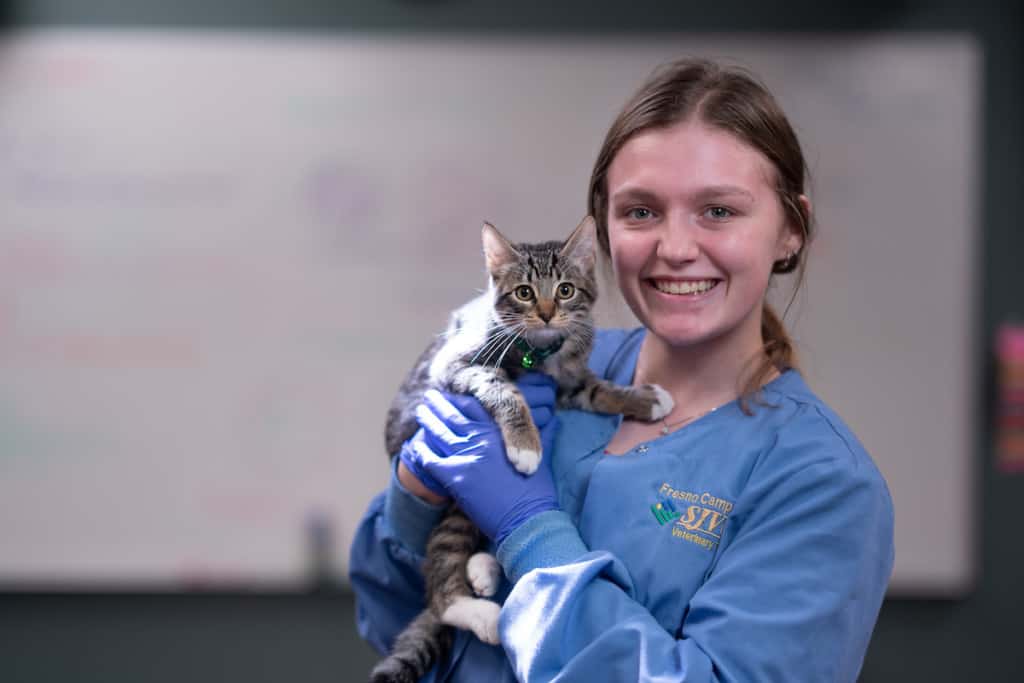Veterinary assistants play an important role in ensuring the well-being of animals who visit veterinary offices. Vet assistants provide support to veterinarians and provide preventive, routine, emergency and postoperative care to pets and other nonfarm animals.
If you have a love for animals, a career as a veterinarian assistant can be rewarding. You can play a direct role in helping animals maintain health and well-being and in providing comfort and happiness to their owners. Learn how to become a vet assistant and what to expect from this important job in this guide.
What Does a Veterinary Assistant Do?
Vet assistants typically work under the supervision of veterinarians and veterinary technologists and technicians. They perform routine animal care tasks. Their duties may include:
- Administering medication and immunizations
- Collect samples such as blood, tissues and urine samples
- Bathing and exercising animals
- Cleaning and disinfecting veterinary facilities, including cages, examination and kennels
- Communicating with veterinarians regarding animal progress
- Examining animals for signs of clinical symptoms or behavioral changes that could indicate injury or illness
- Restraining animals for examinations and lab procedures
- Moving animals during procedures
- Sterilizing instruments for surgery
- Performing Aseptic assistance in surgery, such as passing instruments or opening surgical packs
- Providing first aid
- Providing care before and after surgery and medical procedures
- Sterilizing and maintaining surgical equipment and instruments
- Treating animals who are sick or who have been mistreated
Veterinary assistants may also perform animal intake sessions before a pet owner meets with a veterinarian. In addition to being adept at performing animal care effectively, vet assistants must also be good at communication and show empathy and understanding to pet owners they meet with.
Benefits of Being a Vet Assistant
If you want to work with animals, a vet assistant position typically requires less training time than what’s required of roles like veterinary technologist and technician or veterinarian.
Veterinarian school typically takes 4 years to complete after a 4-year undergraduate degree, while a 4-year bachelor’s degree is typically required for veterinary technologists. Veterinary technicians typically need a 2-year associate degree. Through the Veterinary Assistant program, you can earn a certificate of completion in as few as 9 months.1 2
Since a vet assistant position is an entry-level role in animal care, it’s a role that enables professionals to determine whether they want to further their education and career in the field.
The demand for Veterinary Assistants and Laboratory Animal Caretakers is bright.3
Vet Tech vs Vet Assistant
Vet assistants can enter the animal field more quickly than vet techs and get to work helping animals and assisting veterinarians.
Vet tech roles are more advanced. In particular, only vet techs can induce anesthesia, suture existing skin wounds, extract teeth, or make a port hole to place a catheter.
Because vet tech roles involve more direct animal care for injuries and illnesses, beyond the routine care vet assistants provide, vet techs typically need at least a 2-year associate degree to qualify for a position.
All of these positions – vet assistant, veterinary technician and veterinary technologist – work under the supervision of a veterinarian in similar veterinary clinic work environments. What position you choose to pursue depends on what kind of animal care you want to provide and what kind of education you’re willing to complete.
Why Become a Vet Assistant?
You may want to pursue a vet assistant position if you want to work with animals in a shorter amount of time. In as few as 9 months, you can earn Vet Assistant certification and learn animal care skills including animal nursing fundamentals, animal handling and laboratory procedures.
With veterinary assistant education, you may choose to advance your education to become a veterinary technician, vet technologist or veterinarian. An entry-level veterinarian assistant job can help you determine how involved you want to be in the field and what type of career you want to pursue.
